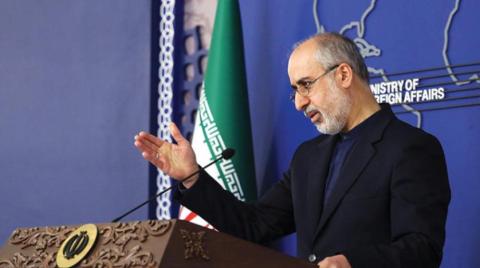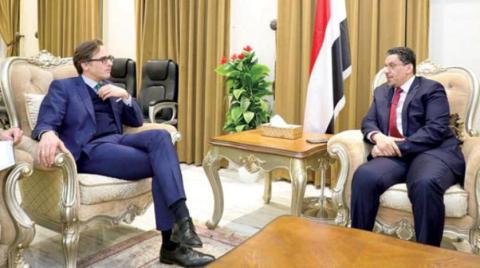
The High-Level Pledging Event for the Humanitarian Crisis in Yemen was held on Tuesday under the chairmanship of Saudi Arabia, with the participation of the UN and more than 120 countries and organizations. According to UN Under-Secretary-General for Humanitarian Affairs and Emergency Relief Mark Lowcock, Yemen needs $2.4 billion to fund relief operations, including $180 million to combat the coronavirus disease (COVID-19). Some 31 pledges were made on Tuesday, totaling $1.35 billion.
The UN official confirmed that the Kingdom was the largest donor with a contribution of $500 million, as Foreign Minister Prince Faisal bin Farhan pointed out in his speech to the conference. Since September 2014, Saudi Arabia has provided its neighbor with more than $16.9 billion, which includes 453 projects of the King Salman Humanitarian Aid and Relief Center covering 12 sectors. Prince Faisal said: “The Saudi Development and Reconstruction Program for Yemen has implemented 175 projects in seven development sectors at a cost of more than $150 million in addition to assistance provided to Yemenis inside the Kingdom and bilateral government assistance.”
Saudi Arabia has also provided a deposit of $3 billion to support the Yemeni currency and the country’s economy, oil derivatives worth $60 million per month to run power stations, and the continuation of the Masam project for clearing landmines and live ammunition from Yemeni land.
Riyadh also affirmed its support for the efforts of UN Special Envoy for Yemen Martin Griffiths and his recent proposals for a permanent cease-fire, the steps to build human and economic confidence, and the resumption of consultations in order to reach a comprehensive political solution. The Kingdom is keen to support all efforts made by the UN aimed at reaching a sustainable political solution to the Yemeni crisis, and also to end the suffering of the Yemeni people. An additional aim is to support the humanitarian, economic and developmental aspects, which will be reflected in the country’s security and stability.
The support provided for Yemen’s humanitarian response plan is made through international aid relief organizations with the aim of reaching all regions of the country, including those under the control of the Houthis. The UN-led talks focus on the performance of these organizations in getting aid to those who are in greatest need. The consensus of reports and data from the last year-and-a-half includes information related to the Houthis’ theft of a great deal of humanitarian aid. In addition, there are suspicions of corruption by some organizations and obstacles being placed by the Iran-backed militia. The UN has been forced to reduce its support in Houthi-controlled areas because the Houthis have used various means of pressure and threats against some of its aid workers.
The donors at the conference had to take a number of points into consideration. The first was that many of those involved in the relief work complain that some organizations are wasting part of the aid and spending it on non-essential items, such as travel, feasibility studies and awareness programs. There are also complaints that some organizations do not distribute aid based on a realistic and accurate study of urgent needs. However, the critical humanitarian situation gives priority to using every dollar of donor support to meet the people’s basic needs of food, health care and education.
Several reports have said that part of the work of aid organizations lacks the element of sustainability, instead focusing on temporary assistance for needy groups and making them dependent on the existence of these organizations. Aid agencies could, for the same cost, adopt projects of a sustainable nature so that the local community depends on those projects once the work of the organizations stops.
Some employees in Yemeni government facilities related to the work of the aid organizations complain that some groups intend to work on their own without coordination with the government so that their work proceeds without oversight and that they avoid actions that may be more beneficial in the eyes of most Yemenis. In the event of any government agency expressing objections, the organizations submit reports accusing them of obstructing their performance. Organizations must understand that they are not a substitute for government, but rather an assistant to the government in carrying out its tasks
Most, if not all, of the organizations in Yemen have their headquarters located in the capital, Sanaa, and are therefore subject to pressure from the Houthis. The Houthis impose lists of people on the organizations who do not meet the criteria of need but who are their supporters. The Houthis thus work to impede the most effective means of ensuring aid gets to those in all governorates who deserve it.
The militia also imposes its own staff on the aid organizations, and this leads to support being taken away from the humanitarian response. This was confirmed by the World Food Programme in a report last year, which said that up to 60 percent of aid was seized and diverted by the Houthis in the areas under their control.
Therefore, donors should ensure there is a clear mechanism by which international organizations are obligated to direct their support to its intended recipients and to create a monitoring mechanism that prevents any violations or abuses, either by the organizations themselves or anybody else.
There is no doubt that donors have the right to ensure that aid reaches those who are entitled to it. The establishment of a clear monitoring mechanism will greatly reduce violations and thus help to achieve the humanitarian goals that donors are seeking and for which they are providing financial assistance.
The Houthis work to impede the most effective means of ensuring aid gets to those in all governorates who deserve it.
Dr. Hamdan Al-Shehri
This week’s conference assured all donors that these comments should not cause them to reduce their level of support. The humanitarian situation in Yemen requires ever more support and all that needs to be done is to control distribution mechanisms and design a monitoring program.
The most important support that can be provided to Yemen is to help its legitimate government regain all its lands and end the occupation of Yemen by the Iranian-backed, terrorist Houthi militia. That occupation is the reason for the political and humanitarian crises in Yemen and, unless UN Security Council resolution 2216 is implemented, the situation will get worse, so the responsibility for avoiding that lies with the international community.
Dr. Hamdan Al-Shehri is a political analyst and international relations scholar. Twitter: @DrHamsheri
Disclaimer: Views expressed by writers in this section are their own and do not necessarily reflect Arab News" point-of-view












